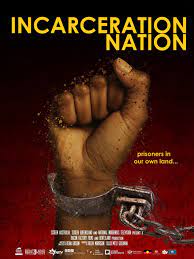
INCARCERATION NATION
Australia, 2021, 90 minutes, Colour.
Directed by Dean Gibson.
Yes, it can be said that Australia has had a history of incarceration, from the arrival of the First Fleet and the subjugation of the long-standing indigenous peoples of the land, the arrival of incarcerated convicts on the initial fleets, of stories of criminals over the last two centuries, there are a lot of prisons in Australia, a lot of incarceration.
However, one of the key issues is that of aboriginal deaths in custody. This documentary takes up this theme, looking back to the enquiry into black deaths of the early 1990s, the recommendations, the recommendations not being followed, further judicial investigations, the investigation into Don Dale Youth Detention Centre in the Northern Territory. And, there are the dreadful statistics of the number of deaths, out of all proportions compared with white deaths in custody even in recent years.
From the NITV site: Aboriginal and Torres Strait Islander peoples are amongst the most incarcerated people in the world. Whilst representing 3.3 per cent of the Australian population, Indigenous men make up 27 per cent of prisoners and women constitute 34 per cent. Approximately 65 per cent of incarcerated children aged between 10 and 13 in Australia are Aboriginal or Torres Strait Islander. Indigenous youth make up 55 per cent of Australia’s youth prison population. There have been at least 478 Indigenous deaths in custody in Australia from 1991 to 20216 — and no criminal convictions for the accused. Incarceration Nation puts First Nations voices front and centre, as they fight for change, visibility and equality.
This is a documentary that should be seen by all Australians.
The advantage of documentary is that it can draw on film and television footage from the last three decades, reminding audiences of the progress, and lack of progress, the nature of the deaths in custody, the reasons, the often seeming apathy of those in charge and responsible, and alarming moments of cruelty and indifference. The main episodes featured, especially through surveillance footage on the actual events, are a challenge to any sense of decency.
While these sequences are highly emotional, especially some of the treatment of children, hours of detention, solitary, physical cruelty and brutality by guards, the documentary is very strong on statistics. They are difficult to take in as they flash up on the screen, so many of them, so overwhelming, always alarming.
Most documentaries depend on the impact that the “talking heads” make. There is a wide variety of men and women who have been invited to contribute, from all walks of life, including Commissioner Mick Gooda, former Redfern boy, Keenan Mundine, who served time, all challenging in their observations, and there pleas for betterment.
Which means that for those who want to use the film for education purposes, something which can be highly recommended, for schools, for discussion groups, for those involved in social welfare, for those involved in legislation for change… It is good to have a copy, to be able to stop and start, to take in the facts, to have time to ponder the implications.
This is a documentary that covers the long past, but, particularly, the last 30 years, a rising of the status quo as we begin the 2020s.